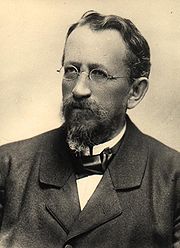
Jan Gebauer
Encyclopedia

Czech studies
Czech studies is the field of humanities that researches, documents and disseminates Czech language and literature in both its historic and present-day forms...
and one of the most renowned Czech scientists of all times. His scientific work was influenced by the methods of positivism
Positivism
Positivism is a a view of scientific methods and a philosophical approach, theory, or system based on the view that, in the social as well as natural sciences, sensory experiences and their logical and mathematical treatment are together the exclusive source of all worthwhile information....
.
Biography
Jan Gebauer was born into a poor family in the small village of ÚbislaviceÚbislavice
Úbislavice is a village and municipality in Jičín District in the Hradec Králové Region of the Czech Republic. -References:...
near the Krkonoše mountains. Thanks to the local clergyman, the talented boy received a chance to study at high school in Jičín
Jicín
Jičín is a town in the Hradec Králové Region of the Czech Republic. It lies approximately 85 km northeast of Prague in the scenic region of the Bohemian Paradise under the Prachov Rocks ....
. After his school-leaving exam, he first went on to study theology
Theology
Theology is the systematic and rational study of religion and its influences and of the nature of religious truths, or the learned profession acquired by completing specialized training in religious studies, usually at a university or school of divinity or seminary.-Definition:Augustine of Hippo...
, but he did not finish it and enrolled philosophy
Philosophy
Philosophy is the study of general and fundamental problems, such as those connected with existence, knowledge, values, reason, mind, and language. Philosophy is distinguished from other ways of addressing such problems by its critical, generally systematic approach and its reliance on rational...
at Charles University instead. During the whole time of his studies, he suffered from a lack of money.
After finishing his studies, he started working as a teacher – in Prague
Prague
Prague is the capital and largest city of the Czech Republic. Situated in the north-west of the country on the Vltava river, the city is home to about 1.3 million people, while its metropolitan area is estimated to have a population of over 2.3 million...
at first, later in Pardubice
Pardubice
Pardubice is the capital city of the Pardubice Region and lies on the river Elbe, 65 miles east of Prague. Pardubice has an antique centre square and old town, with many restaurants that stay open until late in the evening. There is an old Tower and a recently renovated Castle...
, and finally in Prague again. He received his Ph.D.
Ph.D.
A Ph.D. is a Doctor of Philosophy, an academic degree.Ph.D. may also refer to:* Ph.D. , a 1980s British group*Piled Higher and Deeper, a web comic strip*PhD: Phantasy Degree, a Korean comic series* PhD Docbook renderer, an XML renderer...
in 1872 and became a docent
Docent
Docent is a title at some European universities to denote a specific academic appointment within a set structure of academic ranks below professor . Docent is also used at some universities generically for a person who has the right to teach...
of the Czech language at the Charles University in 1873. In 1880 he was named professor extraordinarius and one year later professor ordinarius.
Works
- Historická mluvnice jazyka českého (Historical grammar of the Czech language) – volumes Hláskosloví (Phonology, 1894), Tvarosloví – Skloňování (Morphology – Declension, 1896), Tvarosloví – Časování (Morphology – Conjugation, 1898), Skladba (Syntax, 1929, edited and published by František Trávníček)
- Slovník staročeský (Dictionary of the old Czech language, 1903, 2 volumes, finished and published by Emil Smetánka)
- Mluvnice česká pro školy střední a ústavy učitelské I, II (Czech grammar for middle schools and pedagogical institutes I, II, 1890)
- Krátká mluvnice česká (Short Czech grammar, 1891)

